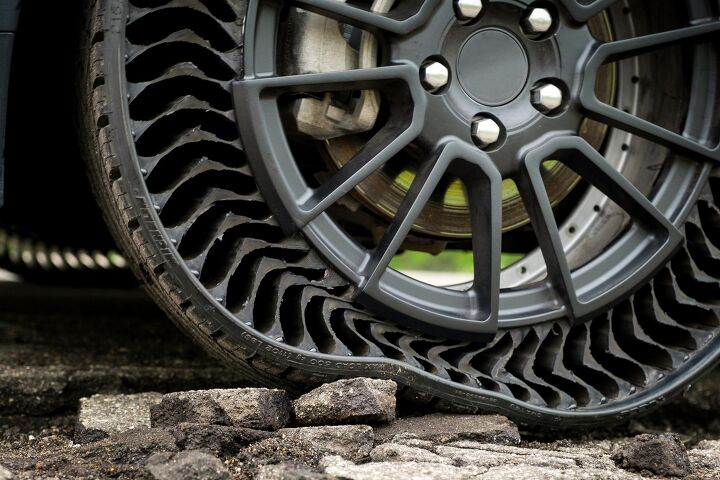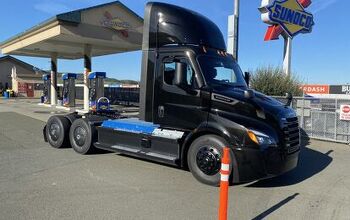Report: Michelin Airless Tires See Alleged Breakthrough

Airless tires are one of those concepts that have been around forever (we used to call them wagon wheels) but never seem to be able to achieve a technological breakthrough that would make them preferable to what’s already on the market. However, Michelin just managed to produce a set it says has been tested at 130 mph that it believes could be ideal for law-enforcement applications.
“The police of some European countries visited us and said, ‘Guys, we want this under our cars, because when we have to rush after the bad guys, usually they put a bullet in our tires before they go. So, we need it.’” Michelin Senior Vice President Bruno de Feraudy told The Drive. “So they wanted to test Uptis, and they tested it at 210 km on our internal test circuit. And it worked well.”
While it’s extremely hard to believe that criminals are routinely going around shooting out the tires of European police vehicles in anticipation of a chase, being puncture-proof is one of the benefits of airless tires. Though run-flats likewise exist and are already pretty popular.
Thus far, Michelin’s airless tires have been tested successfully on smaller off-road vehicles and contracting equipment traveling at lower speeds. But the Uptis (Unique Puncture-Proof Tire System) model has since been tested on regular passenger vehicles at speeds of up to 130 mph. This is a pretty big deal for an airless tire, as high speeds tend to be where they start losing their luster.
Despite being nigh un-puncturable, airless tires usually come with some downsides. Due to their having an internal structure comprised of rubber and compressible plastics, they tend to be much heavier than pneumatic tires. But they also have a tendency to retain heat, which represents a major problem for sustained use at higher speeds.
Michelin seems pretty pleased with the Uptis tire's progress and noted that it’s in talks with General Motors, Tesla, and others “to see what type of applications could be suitable.”
From The Drive:
The Uptis tires appeared on the Chevrolet Bolt in 2019 and on 30 Toyota HiAce DHL delivery vans in Singapore this year to test their usefulness on relatively low-speed delivery vehicles. Now we know the tires can go much faster, although whoever is behind the wheel must be very brave. Michelin didn’t confirm what vehicle the tires were tested on, but said they were “normal police vehicles.” [Editor's note: Normal could be Volvos to Lambos in Europe.] They also told us that they wouldn’t confirm the original 2024 launch date for the tires but said it would be an option and wouldn’t take the place of normal tires.
“It’s not something that will be developed at a broader scale for the time being. We are still working on new solutions, because we are learning a lot with Uptis,” de Feraudy told us.
“Uptis will be very useful for autonomous vehicles, because in autonomous vehicles, what you don’t like is to have a call within the vehicle to say sorry, there is a puncture, can you get out of the vehicle and replace the tire,” said Michelin CEO Florent Menegaux. “But it will not be replacing tires everywhere. It will be more for certain types of applications where a puncture would be a big problem."
We suppose it might work to have airless tires fitted to automobiles unlikely to reach high speeds. They already seem a decent alternative for vehicles that don’t need to cover a lot of ground and may drive over objects that would pop a standard tire. But we’re guessing the technology has a way to go before it can offer the comfort and heat dissipation of pneumatic tires.
The most likely scenario is that airless tires continue to improve and eventually produce hybrid rubber that still uses air but has more internal structuring — resulting in superior versions of the run-flat tires that are available today.
[Images: Michelin]
Become a TTAC insider. Get the latest news, features, TTAC takes, and everything else that gets to the truth about cars first by subscribing to our newsletter.

A staunch consumer advocate tracking industry trends and regulation. Before joining TTAC, Matt spent a decade working for marketing and research firms based in NYC. Clients included several of the world’s largest automakers, global tire brands, and aftermarket part suppliers. Dissatisfied with the corporate world and resentful of having to wear suits everyday, he pivoted to writing about cars. Since then, that man has become an ardent supporter of the right-to-repair movement, been interviewed on the auto industry by national radio broadcasts, driven more rental cars than anyone ever should, participated in amateur rallying events, and received the requisite minimum training as sanctioned by the SCCA. Handy with a wrench, Matt grew up surrounded by Detroit auto workers and managed to get a pizza delivery job before he was legally eligible. He later found himself driving box trucks through Manhattan, guaranteeing future sympathy for actual truckers. He continues to conduct research pertaining to the automotive sector as an independent contractor and has since moved back to his native Michigan, closer to where the cars are born. A contrarian, Matt claims to prefer understeer — stating that front and all-wheel drive vehicles cater best to his driving style.
More by Matt Posky
Latest Car Reviews
Read moreLatest Product Reviews
Read moreRecent Comments
- Tassos Under incompetent, affirmative action hire Mary Barra, GM has been shooting itself in the foot on a daily basis.Whether the Malibu cancellation has been one of these shootings is NOT obvious at all.GM should be run as a PROFITABLE BUSINESS and NOT as an outfit that satisfies everybody and his mother in law's pet preferences.IF the Malibu was UNPROFITABLE, it SHOULD be canceled.More generally, if its SEGMENT is Unprofitable, and HALF the makers cancel their midsize sedans, not only will it lead to the SURVIVAL OF THE FITTEST ones, but the survivors will obviously be more profitable if the LOSERS were kept being produced and the SMALL PIE of midsize sedans would yield slim pickings for every participant.SO NO, I APPROVE of the demise of the unprofitable Malibu, and hope Nissan does the same to the Altima, Hyundai with the SOnata, Mazda with the Mazda 6, and as many others as it takes to make the REMAINING players, like the Excellent, sporty Accord and the Bulletproof Reliable, cheap to maintain CAMRY, more profitable and affordable.
- GregLocock Car companies can only really sell cars that people who are new car buyers will pay a profitable price for. As it turns out fewer and fewer new car buyers want sedans. Large sedans can be nice to drive, certainly, but the number of new car buyers (the only ones that matter in this discussion) are prepared to sacrifice steering and handling for more obvious things like passenger and cargo space, or even some attempt at off roading. We know US new car buyers don't really care about handling because they fell for FWD in large cars.
- Slavuta Why is everybody sweating? Like sedans? - go buy one. Better - 2. Let CRV/RAV rust on the dealer lot. I have 3 sedans on the driveway. My neighbor - 2. Neighbors on each of our other side - 8 SUVs.
- Theflyersfan With sedans, especially, I wonder how many of those sales are to rental fleets. With the exception of the Civic and Accord, there are still rows of sedans mixed in with the RAV4s at every airport rental lot. I doubt the breakdown in sales is publicly published, so who knows... GM isn't out of the sedan business - Cadillac exists and I can't believe I'm typing this but they are actually decent - and I think they are making a huge mistake, especially if there's an extended oil price hike (cough...Iran...cough) and people want smaller and hybrids. But if one is only tied to the quarterly shareholder reports and not trends and the big picture, bad decisions like this get made.
- Wjtinfwb Not proud of what Stellantis is rolling out?





































Comments
Join the conversation
These airless tires are gaining traction (pun intended) in the lawn care industry.
Google "TWEELS",
Or watch https://m.youtube.com/watch?v=A_dU26-vr7I
Yeah, way too pricey for me. But I guess it might be cost-effective for a commercial lawn care biz that goes from house to house all day, where a flat tire on the mower would cost them time and $$.